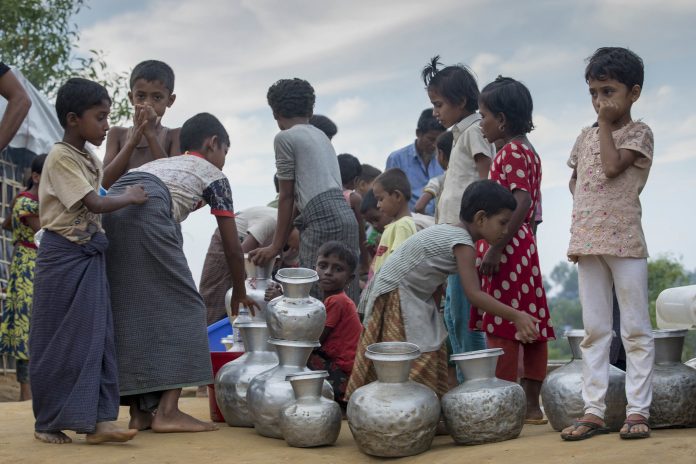“Azida” is a 12-year-old girl, born in Myanmar, but now growing up in neighboring Bangladesh. Forced out of her home at age 10 by a military campaign of ethnic cleansing, she now lives in the sprawling Cox’s Bazar refugee camps on the southern coast of Bangladesh. Among the many stark changes in her new life is the fact that there are no formal schools. In Myanmar, Azida had reached class 5. She should be attending class 7 now, but instead can only take informal classes at a small learning center. When asked about her new life, she voiced a common complaint: “I wish I could move on.”
Like Azida, almost 400,000 school-age Rohingya refugee children in Cox’s Bazar are being denied their right to formal education. The EU should be concerned, and wonder why some of the $51.3 million it has provided to alleviate the Rohingya Refugee Crisis between 2017 and 2019 is being undermined by regressive policies (the lack of detailed, timely, and transparent information about funding makes the exact figures hard to track). Every day that Rohingya children are deliberately denied an education is a human rights violation with long-term consequences.
The Bangladesh government did the right thing in 2017 by opening its doors to more than 700,000 Rohingya refugees in a matter of months, but now it not only prohibits Rohingya children from enrolling in schools outside the camps, it also bars aid groups working in the camps from providing any accredited or formal education. Only an informal learning program aimed at beginner-elementary school children is permitted. Further restrictions include a ban on teaching the Bengali language and the Bangladesh curriculum. Meanwhile, the Myanmar government has also refused to approve the use of its curriculum in the camps.
Bangladesh insists that Myanmar should take back the people it viciously drove out. It has undertaken two attempts at repatriating the Rohingya – both opposed by the refugees. Myanmar is yet to create conditions for safe and voluntary returns. Villages where Rohingya lived have been demolished, 128,000 Rohingya still in Myanmar are interned in camps, and citizenship is still denied broadly to Rohingya. There has been no attempt to ensure accountability for the crimes against humanity that forced the Rohingya out.
Bangladesh is operating on the misguided fear that allowing children their basic right to education will somehow encourage them to stay. But virtually every Rohingya refugee that Human Rights Watch met in the camps said they want to return if citizenship, freedom of movement, and other protections are ensured. This fallacy is deliberately depriving children of education, exacerbating a human rights crisis.
The informal education program taught at Azida’s learning center was devised by UNICEF, the UN children’s agency, in a careful attempt to avoid the Bangladesh government’s red lines. Yet it took the Bangladesh government a year to approve the first two “levels” of the UNICEF curriculum, equivalent to preschool and the beginning of primary school. The three upper levels still await approval. While the informal program is a step up, refugee parents consistently told us that they want their children to study the Myanmar curriculum.
Quality education could help Rohingya children recover from the brutalities they suffered or witnessed and regain a sense of purpose. It would also prepare them to be self-sufficient. The ban on formal education risks forcing Rohingya into dependency on humanitarian donations, exploitation in hazardous jobs, or child marriage. Some children denied education and despairing for a better future have been preyed on by criminal trafficking networks.
The EU needs a common position on this to promote quality education, without discrimination. It is well-placed to press for allowing all children in Bangladesh access to formal, accredited education from pre-primary through secondary school. It is also important to show that international aid for Rohingya children is a win-win for Bangladesh, by meeting its funding commitments for the Rohingya and for Bangladeshi children in Cox’s Bazar, who have some of the worst dropout rates and student-teacher ratios in the country. The EU is in a unique position to speak up for children like Azida, as well as the countless others who are being denied a fair chance at a new life.
Alex Firth is a Children’s Rights Associate at Human Rights Watch.

